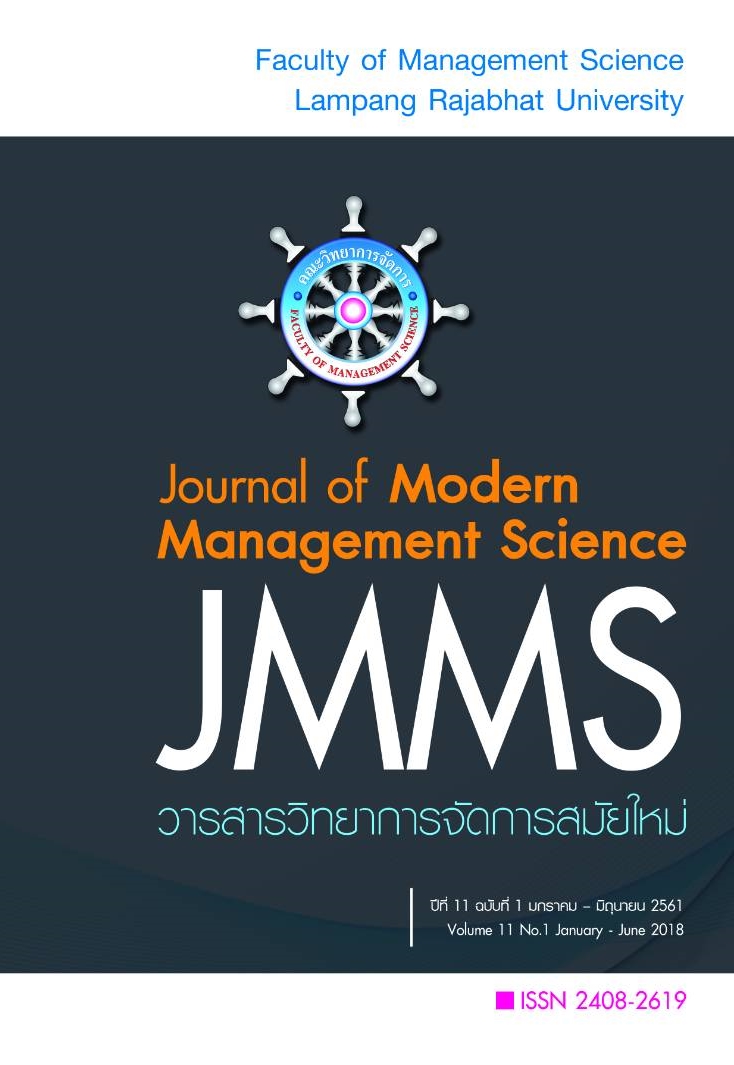Paradigm Shift of Participatory Approach to Value Added Creation for Sustainability of Community based Tourism: A case in Ban Prok Sub District, Samut Songkhram Province
Main Article Content
Abstract
This research aimed to find ways and means of shifting paradigm of establishing collaboration among stakeholders to create community involvement in the development of value-added tourism products and services in Ban Prok Sub District, Mueang Samut Song Khram District Samut Songkhram Province. The research used Appreciative Participatory Planning and Actions (APPA) approach to be a direction for studying it. The data-gathering activities included group discussion and exchanging ideas between the stakeholders in order to understand the situation and able to analyze problems of the community. The researcher played a role as a facilitator and observer. In addition, an in-depth interview was also conducted to gain in-sight information from their perspectives.
According to the studies, in the past, all communities, working on developing community based tourism, believe that the communities can do the same without looking into their natures and potentials. However, neither everyone has or understands the same goals. It resulted in a new paradigm, suitable with the context of the particular area. The study indicated that the appropriate working way of collaborative network is the Creating Shared Values approach, which people can work to achieve particular goals together to create value. This collaboration depends on the project (Projected Community Relations), which neither person nor place is adherent to. In addition, this is consistent to Shareholder Leadership style, which is delegated an authorization to everyone. Leaders and all members have equal leadership as partners.
Article Details
The article must be considered and accepted for publication by the editorial board of the Faculty of Management Science, Lampang Rajabhat University. The articles have been reviewed by a peer (peer review) and the author must update according to the suggestion if available before publication. Articles that are not considered the editorial team will inform the results of the consideration but will not send the original to the author.
JMMS is the Faculty of Management Science journal, Lampang Rajabhat University. Jmms published both print and online editions. We allow the use of articles for academic use under the scope of copyright law.
References
พจนา สวนศรี. (2546). การจัดการนันทนาการและการท่องเที่ยวทางธรรมชาติ. เอกสารการสอนชุดวิชาหน่วยที่ 8-15. พิมพ์ครั้งที่ 2. นนทบุรี: สานักพิมพ์มหาวิทยาลัยสุโขทัยธรรมาธิราช
พระมหาสุทิตย์ อาภากโร. (2547). เครือข่าย : ธรรมชาติ ความรู้ และการจัดการ. กรุงเทพมหานคร: สถาบันเสริมสร้างการเรียนรู้เพื่อชุมชนเป็นสุข.
สุภางค์ จันทวานิช. (2554). การวิเคราะห์ข้อมูลในการวิจัยเชิงคุณภาพ. พิมพ์ครั้งที่ 10. กรุงเทพมหานคร: สำนักพิมพ์แห่งจุฬาลงกรณ์มหาวิทยาลัย.
Aaker, D. A. (2001). Strategic Market Management. (6th ed). New York, NY: John Wiley and Sons
Block, P. (1993). Stewardship: Choosing Service over Self-Interest. San Francisco, CA: Berrett-Koehler.
James, P., Nadarajah, Y., Haive, K. & Stead, V. (2012). Sustainable Communities, Sustainable Development: Other paths for Papua New Guinea. Honolulu, HI: University of Hawaii Press.
Hammond, S. A. (2013). The Thin Book of Appreciative Inquiry. Bend, OR: Thin Book Publishing.
Strauss, A. L., & Corbin, J. M. (1998). Basics of Qualitative Research: Techniques and Procedures for Developing Grounded Theory. Thousand Oaks, CA: Sage Publications.
Wisansing, J. & Hongchatikul, U. (2012). Appreciative Inquiry (AI) Framework and Participatory Techniques for Sustainable Tourism Development: Case Examples from Thailand. Paper presented at the 2012 Conference on Sustainable Business in Asia. 1 – 3 November 2012, Landmark Bangkok Hotel.


